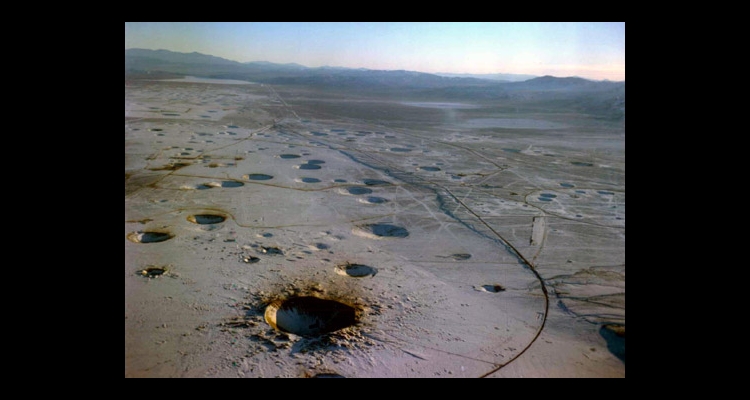Sedan Crater
Sedan Crater is the largest ground depression resulting from a nuclear detonation in the United States. On July 6, 1962, the Atomic Energy Commission, a predecessor of the Department of Energy, unleashed a 104 kiloton nuclear explosion resulting in a crater 1,280 feet in diameter and 320 feet deep. The Sedan experiment used an explosive device 3.5 times greater than any similar event at the Nevada Test Site. The explosion displaced approximately 7.5 million tons of earth, scattering it over 2,500 acres. The event covered vegetation and soil in radioactive material as far away as 10,000 feet from ground zero.
The Sedan experiment was part of the Plowshare Program, established in June 1957 to explore peaceful applications for controlled nuclear detonations. The program took its name from the Bible: "And they shall beat their swords into plowshares" (Isaiah 2:4). Ultimately, Plowshare resulted in 23 thermonuclear detonations in Nevada, two in New Mexico, and three in Colorado. Only four events were intended to produce craters, all of which were at the Nevada Test Site, and Sedan was by far the largest.
Possible uses for the Plowshare Program included the excavation of secondary canals between the Atlantic and Pacific Oceans and between the Mediterranean and Red Seas. Planners also hoped the program could assist with mining and the construction of harbors and dams. Plowshare ended with President John Kennedy's August 1963 test ban treaty signed with the Soviet Union. In addition, the Sedan event and the other related experiments demonstrated that radioactive contamination in the surrounding areas made the technology prohibitive in area that might become populated.
Today, Russian thistle, also known as tumbleweed, dominates the plant species that have crept back into the Sedan Crater site. Some grasses have also taken root. An analysis in 1993 observed that the original perennial shrubs once living there had shown absolutely no recovery. The Sedan Crater was listed in the National Register of Historic Places in 1994.
Article Locations
Related Articles
None at this time.

